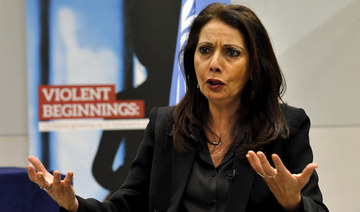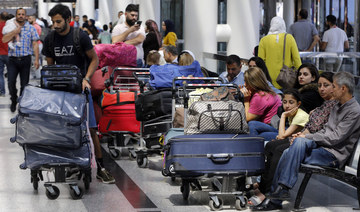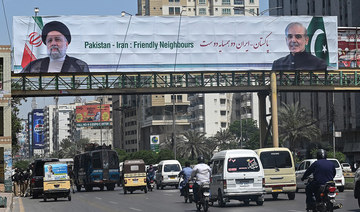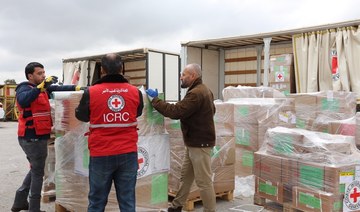PARALIMNI, Cyprus: Many well-off Lebanese who escaped their country’s economic tailspin for a new life in the nearby island nation of Cyprus say the transition has been a whirlwind of emotions.
They are grateful they did not have to turn to human smugglers and embark on risky Mediterranean crossings to reach European shores. But they also feel guilty for leaving family and friends behind to struggle with Lebanon’s unprecedented crises — a failing economy, political uncertainty and social upheaval.
The feelings are intense for Celine Elbacha, an architect who moved with her family of four to the Mediterranean island nation in August 2020, and Nadine Kalache Maalouf, who arrived with her husband and two children four months ago.
They are among more than 12,000 Lebanese who have left their homeland in the past two years for Cyprus — less than a 50-minute flight from Beirut — enrolling their kids in schools, setting up businesses and snapping up apartments on the island.
“We were fortunate to be able to come,” Maalouf said. “We’re doing our best here as a Lebanese community to help ... our families, our friends back home. So it’s not like we just moved and we turned our backs and we’re not looking back.”
Thousands of Lebanese, including teachers, doctors and nurses have left the country amid a devastating economic crisis that has thrown two thirds of the country’s population into poverty since October 2019. That brain drain accelerated after the massive explosion at Beirut’s port last year, when a stockpile of improperly stored ammonium nitrates detonated, killing at least 216 people and destroying several residential areas.
The exodus is telling about the state of Lebanon, where not only the poor are seeking a way out, but also a relatively well-off middle class that has lost faith in the country turning itself around.
For those who can afford it, Cyprus, a member of the European Union, is an attractive option for its proximity and the facilities it offers — including residency for a certain level of investment in real estate and businesses. As Lebanese banks clamped down on deposits, many sought to open bank accounts in Cyprus or buy apartments as a way to free up their money.
The island has a history of taking in Lebanese, who first came in the 1980s, at the height of Lebanon’s 15-year-civil war, and again in 2006, when Cyprus served as a base for evacuating civilians during the month-long war between Israel and Lebanon’s militant Hezbollah group.
Maalouf, 43, who made the move to Cyprus with her husband and two kids, said she was pleasantly surprised by how “easy” the relocation process was. She hasn’t found work yet but has connected with Cyprus’ close-knit Lebanese community.
“We were scared about this step,” she said, but Cypriot immigration authorities “made that very smooth and very easy.”
Cyprus’ Interior Ministry spokesman Loizos Michael confirmed to The Associated Press that the government has “simplified procedures” for Lebanese nationals who wish to immigrate lawfully, “as part of humanitarian assistance” to Lebanon.
Additionally, incentives are offered to Lebanese businessmen who wish to transfer their businesses to Cyprus, Michael said, without elaborating.
Maalouf said her primary motivation was to shield her children from Lebanon’s dire economic situation — runaway inflation has seen the Lebanese pound lose more than 90 percent of its value in less than two years — and provide them with a chance for a better future.
“It’s scary when you’re a parent, you’re scared and you say, OK, I need to save my kids,” said Maalouf.
The transition was easier for 47-year-old Elbacha and her family. They had bought a vacation home in Cyprus years ago in the town of Paralimni on the island’s east coast and felt they already had a footing here.
Her elder daughter, Stephanie, has been studying at a university in Paris for two years now. Her younger daughter, 17-year-old Morgane, was fortunate to get into Cyprus’ only French-speaking school in Nicosia, the capital.
Elbacha and her husband, also an architect, have set up a company in Cyprus and are both working. They have a sense of obligation to the country that has welcomed them, she said.
“We want to be feeling like we are not illegal in the country,” she said. Cyprus has helped them “in every sense, and it’s like we have to return this.”
Elbacha is lucky, she says, especially when she remembers how powerless many Lebanese feel in the face of constant feuds and bickering among the political elite. Her home in Beirut sustained minor damage in the Aug. 4, 2020 port explosion, mostly broken glass. None of the four of them were hurt but some of her friends and relatives fared much worse.
Later that month, the family moved to Cyprus. The first five months here, she remembers feelings of guilt, like she was “betraying my country,” she said.
Maalouf, who also ended up with her family in Paralimni, has little faith things will turn around in Lebanon anytime soon, despite upcoming general elections. “I’ve been hearing this since I was a teenager. Things will get better. We’ll see and things never get better,” she said.
For its proximity to Lebanon, Cyprus is in many ways ideal for both Maalouf and Elbacha. They can easily visit family and friends back in Beirut.
“The people of Cyprus are very warm and welcoming,” said Maalouf. “We don’t feel like strangers here.”
In exodus from Lebanon, the well-off find new home in Cyprus
https://arab.news/vyaqy
In exodus from Lebanon, the well-off find new home in Cyprus
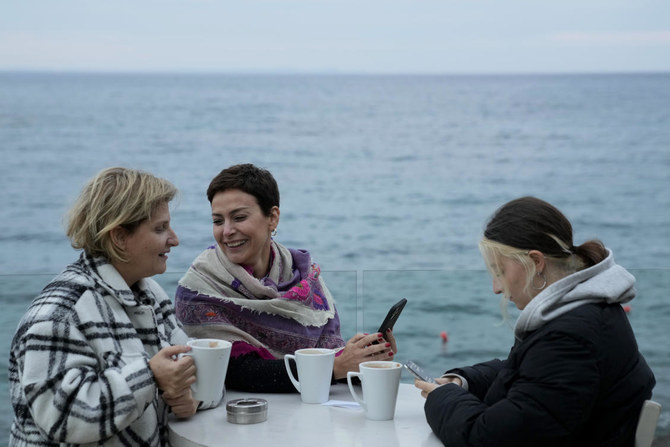
- They are grateful they did not have to turn to human smugglers and embark on risky Mediterranean crossings to reach European shores
- Thousands of Lebanese, including teachers, doctors and nurses have left the country amid a devastating economic crisis
UN chief calls for ‘immediate’ Gaza ceasefire, hostage release

- Israeli strikes on Gaza continued Sunday after it expanded evacuation order for Rafah operation
- Gaza war tearing families apart, rendering people homeless, hungry and traumatized, says UN chief
KUWAIT CITY: UN Secretary-General Antonio Guterres on Sunday urged an immediate halt to the Israel-Hamas war in Gaza, the return of hostages and a “surge” in humanitarian aid to the besieged Palestinian territory.
“I repeat my call, the world’s call for an immediate humanitarian ceasefire, the unconditional release of all hostages and an immediate surge in humanitarian aid,” Guterres said in a video address to an international donors’ conference in Kuwait.
“But a ceasefire will only be the start. It will be a long road back from the devastation and trauma of this war,” he added.
Israeli strikes on Gaza continued on Sunday after it expanded an evacuation order for Rafah despite international outcry over its military incursion into eastern areas of the city, effectively shutting a key aid crossing.
“The war in Gaza is causing horrific human suffering, devastating lives, tearing families apart and rendering huge numbers of people homeless, hungry and traumatized,” Guterres said.
His remarks were played at the opening of the conference in Kuwait organized by the International Islamic Charitable Organization (IICO) and the UN’s humanitarian coordination organization OCHA.
On Friday, in Nairobi, the UN head warned Gaza faced an “epic humanitarian disaster” if Israel launched a full-scale ground operation in Rafah.
Gaza’s bloodiest-ever war began following Hamas’s unprecedented October 7 attack on Israel that resulted in the deaths of more than 1,170 people, mostly civilians, according to an AFP tally of Israeli official figures.
Vowing to destroy Hamas, Israel launched a retaliatory offensive that has killed more than 34,971 people in Gaza, mostly women and children, according to the Hamas-run territory’s health ministry.
UN chief calls for ‘immediate’ Gaza ceasefire, hostage release

- UN chief: ‘The war in Gaza is causing horrific human suffering, devastating lives, tearing families apart and rendering huge numbers of people homeless, hungry and traumatized’
KUWAIT CITY: UN Secretary-General Antonio Guterres on Sunday urged an immediate halt to the Israel-Hamas war in Gaza, the return of hostages and a “surge” in humanitarian aid to the besieged Palestinian territory.
“I repeat my call, the world’s call for an immediate humanitarian ceasefire, the unconditional release of all hostages and an immediate surge in humanitarian aid,” Guterres said in a video address to an international donors’ conference in Kuwait.
“But a ceasefire will only be the start. It will be a long road back from the devastation and trauma of this war,” he added.
Israeli strikes on Gaza continued on Sunday after it expanded an evacuation order for Rafah despite international outcry over its military incursion into eastern areas of the city, effectively shutting a key aid crossing.
“The war in Gaza is causing horrific human suffering, devastating lives, tearing families apart and rendering huge numbers of people homeless, hungry and traumatized,” Guterres said.
His remarks were played at the opening of the conference in Kuwait organized by the International Islamic Charitable Organization (IICO) and the UN’s humanitarian coordination organization OCHA.
On Friday, in Nairobi, the UN head warned Gaza faced an “epic humanitarian disaster” if Israel launched a full-scale ground operation in Rafah.
Gaza’s bloodiest-ever war began following Hamas’s unprecedented October 7 attack on Israel that resulted in the deaths of more than 1,170 people, mostly civilians, according to an AFP tally of Israeli official figures.
Vowing to destroy Hamas, Israel launched a retaliatory offensive that has killed more than 34,971 people in Gaza, mostly women and children, according to the Hamas-run territory’s health ministry.
Iran conservatives tighten grip in parliament vote

- Elected members are to choose a speaker for the 290-seat parliament when they begin their work on May 27
- Conservatives won the majority of the 45 remaining seats up for grabs in the vote held in 15 of 31 provinces: local media
TEHRAN: Iran’s conservatives and ultra-conservatives clinched more seats in a partial rerun of the country’s parliamentary elections, official results showed Saturday, tightening their hold on the chamber.
Voters had been called to cast ballots again on Friday in regions where candidates failed to gain enough votes in the March 1 election, which saw the lowest turnout — 41 percent — since the 1979 Islamic Revolution.
Candidates categorized as conservative or ultra-conservative on pre-election lists won the majority of the 45 remaining seats up for grabs in the vote held in 15 of Iran’s 31 provinces, according to local media.
For the first time in the country, voting on Friday was a completely electronic process at eight of the 22 constituencies in Tehran and the cities of Tabriz in the northwest and Shiraz in the south, state TV said.
“Usually, the participation in the second round is less than the first round,” Interior Minister Ahmad Vahidi told reporters in Tehran, without specifying what the turnout was in the latest round.
“Contrary to some predictions, all the candidates had a relatively acceptable and good number of votes,” he added.
Elected members are to choose a speaker for the 290-seat parliament when they begin their work on May 27.
In March, 25 million Iranians took part in the election out of 61 million eligible voters.
The main coalition of reform parties, the Reform Front, had said ahead of the first round that it would not participate in “meaningless, non-competitive and ineffective elections.”
The vote was the first since nationwide protests broke out following the September 2022 death in custody of Mahsa Amini, a 22-year-old Iranian Kurd, arrested for allegedly breaching the Islamic republic’s strict dress code for women.
In the 2016 parliamentary elections, first-round turnout was above 61 percent, before falling to 42.57 percent in 2020 when elections took place during the Covid pandemic.
UN reports fighting in Sudan’s Darfur involving ‘heavy weaponry’

- The United States last month warned of a looming rebel military offensive on the city, a humanitarian hub that appears to be at the center of a newly opening front in the country’s civil war
PORT SUDAN: A major city in Sudan’s western region of Darfur has been rocked by fighting involving “heavy weaponry,” a senior UN official said Saturday.
Violence erupted in populated areas of El-Fasher, putting about 800,000 people at risk, Clementine Nkweta-Salami, the UN’s humanitarian coordinator for Sudan, said in a statement.
Wounded civilians were being rushed to hospital and civilians were trying to flee the fighting, she added.
“I am gravely concerned by the eruption of clashes in (El-Fasher) despite repeated calls to parties to the conflict to refrain from attacking the city,” said Nkweta-Salami.
“I am equally disturbed by reports of the use of heavy weaponry and attacks in highly populated areas in the city center and the outskirts of (El-Fasher), resulting in multiple casualties,” she added.
For more than a year, Sudan has suffered a war between the army, headed by the country’s de facto leader Abdel Fattah Al-Burhan, and the paramilitary Rapid Support Forces (RSF), commanded by his former deputy Mohamed Hamdan Dagalo.
The war has killed tens of thousands of people and forced more than 8.5 million to flee their homes in what the United Nations has called the “largest displacement crisis in the world.”
The RSF has seized four out of five state capitals in Darfur, a region about the size of France and home to around one quarter of Sudan’s 48 million people.
El-Fasher is the last major city in Darfur that is not under paramilitary control and the United States warned last month of a looming offensive on the city.
UN chief Antonio Guterres said Saturday he was “very concerned about the ongoing war in Sudan.”
“We need an urgent ceasefire and a coordinated international effort to deliver a political process that can get the country back on track,” he said in a post on social media site X.
Tunisian police arrest prominent lawyer critical of president

- Dozens of lawyers took to the streets in protest on Saturday night, carrying banners reading “Our profession will not kneel” and “We will continue the struggle” Saied came to power in free elections in 2019
TUNIS: Tunisian police stormed the building of the Deanship of Lawyers on Saturday and arrested Sonia Dahmani, a lawyer known for her fierce criticism of President Kais Saied, and then arrested two journalists who witnessed the confrontation, a journalists’ syndicate said.
Two IFM radio journalists, Mourad Zghidi and Borhen Bsaiss, were arrested, an official in the country’s main journalists’ syndicate told Reuters. The incident was the latest in a series of arrests and investigations targeting activists, journalists and civil society groups critical of Saied and the government. The move reinforces opponents’ fears of an increasingly authoritarian government ahead of presidential elections expected later this year.
Dahmani was arrested after she said on a television program this week that Tunisia is a country where life is not pleasant. She was commenting on a speech by Saied, who said there was a conspiracy to push thousands of undocumented migrants from Sub-Saharan countries to stay in Tunisia. Dahmani was called before a judge on Wednesday on suspicion of spreading rumors and attacking public security following her comments, but she asked for postponement of the investigation.
The judge rejected her request. Dozens of lawyers took to the streets in protest on Saturday night, carrying banners reading “Our profession will not kneel” and “We will continue the struggle” Saied came to power in free elections in 2019. Two years later he seized additional powers when he shut down the elected parliament and moved to rule by decree before assuming authority over the judiciary.
Since Tunisia’s 2011 revolution, the country has won more press freedoms and is considered one of the more open media environments in the Arab world. Politicians, journalists and unions, however, say that freedom of the press faces a serious threat under the rule of Saied. The president has rejected the accusations and said he will not become a dictator.



